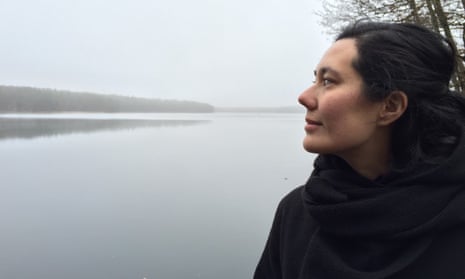The last year has seen a fine crop of landscape memoirs by women: Melissa Harrison’s Rain, Amy Liptrot’s The Outrun, Karen Lloyd’s The Gathering Tide, Jean McNeil’s The Ice Diaries and Clover Stroud’s The Wild Other are notable among them.
Turning: A Swimming Memoir is Jessica J Lee’s debut and it documents her attempt to swim in 52 German lakes over 52 weeks. Her triggers for this undertaking are the desire to overcome a broken heart, and the need to haul herself from the deadening depression that accompanies it. Turning owes a debt to John Cheever’s The Swimmer, Roger Deakin’s Waterlog (which was inspired by Cheever) and perhaps also to Kate Rew’s Wild Swim. Indeed, the “frog’s eye view” that Deakin described is alluded to, perhaps unwittingly, by Lee when she stops to examine some migrating toads that have successfully crossed a road to reach their spawning ground: “I stop and examine a few who have made it to the roadside alive, getting on my knees to look at them from eye-level, and then cycle on, trying in vain to avoid the dead ones as they dot the ground.”
The “turning” of the title refers to the way the water within the lakes changes with the seasons. “In spring, the winter ice melts, and the warm and cold of the lake intermingle. In summer … a green froth of algae caps the surface … and when it cools in autumn, the green disappears. The leaves flash red and gold. And the water ‘turns’.”
Lee begins her journey in summer, the water clouded by algae, depth obscured. Her depression is raw. The love she has lost was also her swimming companion; there is an element of exorcism in the task. Yet the environmentalist in her remains lucid: “If you’ve ever counted the rings on a tree stump, you have a sense of the way the landscape holds its own history; the way time recedes beneath the surface of the ground. Sand, gravel and rock layered year by year. Ice is layered just the same – glaciers hold their ages in their cores.” The glaciers are what formed the lakes, and “glacial spillways and plateaus undulate across the landscape” of the North German Plain.
Lee is Canadian, and of Chinese/Welsh ancestry. She too holds her history in her core: “I live in that unsteady balance, a borderland marked on my body. It brings up a kind of uninterrogated discomfort.” Ideas about identity, borders, migration and asylum permeate the book, although the “real world” – in which people die in a Paris shooting – is held at a distance, it is the uninterrogated discomfort beyond this particular narrative. Although the word doesn’t appear in the book, the Welsh concept of hiraeth, meaning a kind of nostalgia, or homesickness, permeates Turning. The German word sehnsucht, meaning an addictive longing, although not necessarily for a place that one knows, might also be a candidate. Although, there’s a sadness implicit in hiraeth, and despite Lee’s emotional numbness, a sense of loss underpins her adventure.
As Lee swims through autumn towards the frozen lakes of winter her writing becomes less melancholy, more proactive. This isn’t nature as consolation. Rather, it is nature as masochism or even – disconcertingly – self-harm. On her winter swims Lee carries a hammer and uses it to smash a place in which she can swim. “Hammering away, my arms grow warm with the work of it as my legs grow cold in the water. Soon, the opening is five feet across and I’m able to stretch out into it, to luxuriate in the sensation of pain that washes over my limbs.” She discusses the symptoms and conditions that precipitate hypothermia, but ignores the risk that she might get cramp, or that the broken ice sheets might trap her. She dives from a jetty seemingly in direct response to a sign that says: No Diving. Morally, the book is disconcerting. What is it we are being asked to watch? Lee is intelligent and controlled, her writing clean and accurate, and one might almost be lulled into ignoring the hazards to which she repeatedly exposes herself. Her winter swims are a quest for the “swimmer’s high” – the inevitable endorphin rush that accompanies “cold shock”.
As the season turns again, Lee becomes stronger and she begins to make new connections both within the landscape and with those around her. She is still pushing at her own boundaries – she camps alone for the first time – but she takes an active delight in the “series of vignettes” that is life on a campsite. She engages with the wildlife of the shore.
Turning is many things: a snapshot of Berlin seen through the prism of its lakes; the story of a broken and healing heart; a contemplation of identity; a coming-of-age story. Perhaps most of all it is a journey through the senses. In recording her experience Lee explores ideas about memory, and examines the way she experiences and retains physical and emotional trauma. She discovers that she, and we, might erase or change our personal ghosts and recollections by simply overwriting them, layering them with new and different sensations, including different kinds of pain, until she, like the lakes she has come to know so well, has fully succeeded in turning.

Comments (…)
Sign in or create your Guardian account to join the discussion